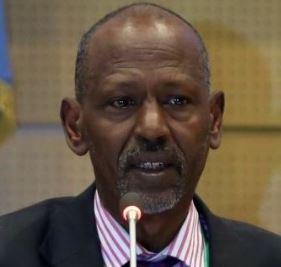As the National Constitution Review Commission (NCRC) launched the Civic Education and Public Consultation Campaign on Thursday in Juba, peace monitors voiced concerns over rising political tensions between President Salva Kiir and First Vice President Riek Machar, warning that these disputes could undermine the progress made so far.
Speaking at the ceremony held at Freedom Hall, Ambassador Ismail Wais, the special representative of the Intergovernmental Authority on Development (IGAD), stressed the importance of prioritizing dialogue over conflict.
He disclosed that his prepared speech was meant to inspire hope among the people of South Sudan regarding the prospect of a permanent constitution. However, due to the recent escalation of tensions, he was unable to deliver those words as intended.
“I had prepared a speech of hope and shared commitment, but after the news of last night (house arrest of Dr. Machar), I could not in good conscience deliver those words,” Amb. Wais said. “On this day, I stand before you with a heavy heart, burdened by the unfolding crisis that threatens the fragile peace we have fought so hard to bear.”
The IGAD diplomat warned that South Sudan is at the point of erasing all that it has gained over the years, placing the 2018 revitalized peace agreement on the brink of collapse.
“Once again, South Sudan stands at a crossroads, within peace and peril, between unity and strife. The written history, the escalation of violence among the very parties, and firstly, with safeguarding the rest of this agreement, have access to return and undo every gain we have made,” he warned.
Amb. Wais said the only way out at the moment is for the signatories to the peace agreement to dialogue, pointing that it’s paramount to ensure there’s lasting peace as citizens have endured suffering for long.
“The rhetoric of division must end. The only part forward is dialogue, not violence, discussion, not conflict issues. We have come too far to tell that now. For years, South Sudanese people have endured unimaginable suffering. We have buried your loved ones, worked for the lost future, and struggled to rebuild from ashes. Yet again, all the odds you dared to hope. You signed a peace agreement not for yourself,” he said. “To the leaders of South Sudan, I urge you, I beg you, and I appeal to you! You fought for this nation’s independence, will you now allow petty revolutionaries, mistrust, and ambition to destroy what you have required so much to build? The world is watching, history will judge. This is not just about politics, it is about moral responsibility. It is more to lead, not to take this nation back into darkness.”
For his part, George Aggrey Owinow, Chairperson of the Revitalized Joint Monitoring and Verification Mechanism (RJMEC), called on the South Sudanese leaders to bear in mind that while laying foundation for a united and prosperous society, it is paramount to consider peaceful co-existence, human rights and rule of law.
“I want to remind you about a solid commitment and that the foundation for a united, peaceful, and prosperous society is based on justice, equality, respect for human rights, and the rule of law,” Owinow said. “I appeal to the leaders to record their determination to compensate the people of South Sudan, by committing themselves to peace and political commitment, and not to repeat the past mistakes.”
He also appealed to the parties to continue with the peace implementation, especially the constitution-making process, which is vital for the conduct of elections next year.
“Finally, I appeal to the parties to financially support the NCRC in rolling out its comprehensive civic leadership and public consultation plan, and delivering a popular people-centered constitution that will address the root causes of the office in this country,” he said.




